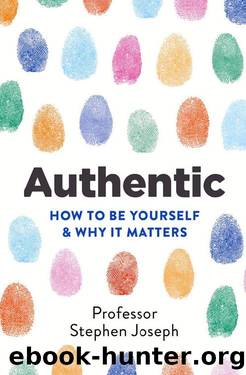Authentic by Stephen Joseph

Author:Stephen Joseph [Joseph, Stephen]
Language: eng
Format: epub
ISBN: 9780349404851
Publisher: Little, Brown Book Group
Published: 2016-08-31T22:00:00+00:00
Strategies we resort to when we fear failure
One way we protect ourselves from threatening self-knowledge is through self-handicapping. Self-handicapping is when people fear failure and are uncertain of their ability to succeed at a task: for example, just before an important singing audition we might claim we are ill. We might even convince ourselves that this is the case. We go into the audition and apologise for our sore throat before we sing the first notes. Self-handicapping is a topic studied by social psychologists interested in how people create and find impediments that reduce the likelihood of good performance or that act as ‘insurance’ against the possibility that it might not be a good performance. Both are means of protecting our self-esteem. If we fail, then we can attribute our failure to something beyond our control.
People self-handicap in two ways. Behavioural self-handicapping is when we do things ourselves, such as drink too much alcohol, don’t put enough music practice in, or spend our time doing something other than what we need to do. Self-reported handicapping is when we report feeling ill or suffering from anxiety, or other psychological problems. Both of these operate in different ways. Behavioural self-handicapping does actually reduce our chances of success, whereas self-reported handicapping simply saves face if we fail, but, by itself, it doesn’t reduce our chances of success. In general, although self-handicapping can protect our self-esteem, it is not what mentally healthy people do, and the self-esteem that it protects is built on self-deception.
In a fascinating study, Ahmet Akin and Ümran Akin at Sakarya University in Turkey30 asked students to complete a Turkish version of the Authenticity Scale and the Self-handicapping Scale, which consists of 25 statements that people agree or disagree with. An example is, ‘I try not to get too intensely involved in competitive activities, so that it won’t hurt too much if I lose or do poorly.’ They found that those who scored higher on the Self-handicapping Scale were less likely to know themselves, own themselves and be themselves. Authentic people, it would seem, have less need for such defensive strategies as self-handicapping, because they do not worry about protecting their self-image.
Download
This site does not store any files on its server. We only index and link to content provided by other sites. Please contact the content providers to delete copyright contents if any and email us, we'll remove relevant links or contents immediately.
Rewire Your Anxious Brain by Catherine M. Pittman(17589)
Talking to Strangers by Malcolm Gladwell(11879)
The Art of Thinking Clearly by Rolf Dobelli(8842)
Mindhunter: Inside the FBI's Elite Serial Crime Unit by John E. Douglas & Mark Olshaker(7834)
Becoming Supernatural by Dr. Joe Dispenza(7106)
Change Your Questions, Change Your Life by Marilee Adams(6641)
The Road Less Traveled by M. Scott Peck(6635)
Nudge - Improving Decisions about Health, Wealth, and Happiness by Thaler Sunstein(6633)
The Lost Art of Listening by Michael P. Nichols(6474)
Enlightenment Now: The Case for Reason, Science, Humanism, and Progress by Steven Pinker(6406)
Win Bigly by Scott Adams(6312)
Mastermind: How to Think Like Sherlock Holmes by Maria Konnikova(6236)
The Way of Zen by Alan W. Watts(5800)
Daring Greatly by Brene Brown(5642)
Grit by Angela Duckworth(4738)
Big Magic: Creative Living Beyond Fear by Elizabeth Gilbert(4723)
Men In Love by Nancy Friday(4326)
Flow by Mihaly Csikszentmihalyi(4053)
The Four Tendencies by Gretchen Rubin(4024)
